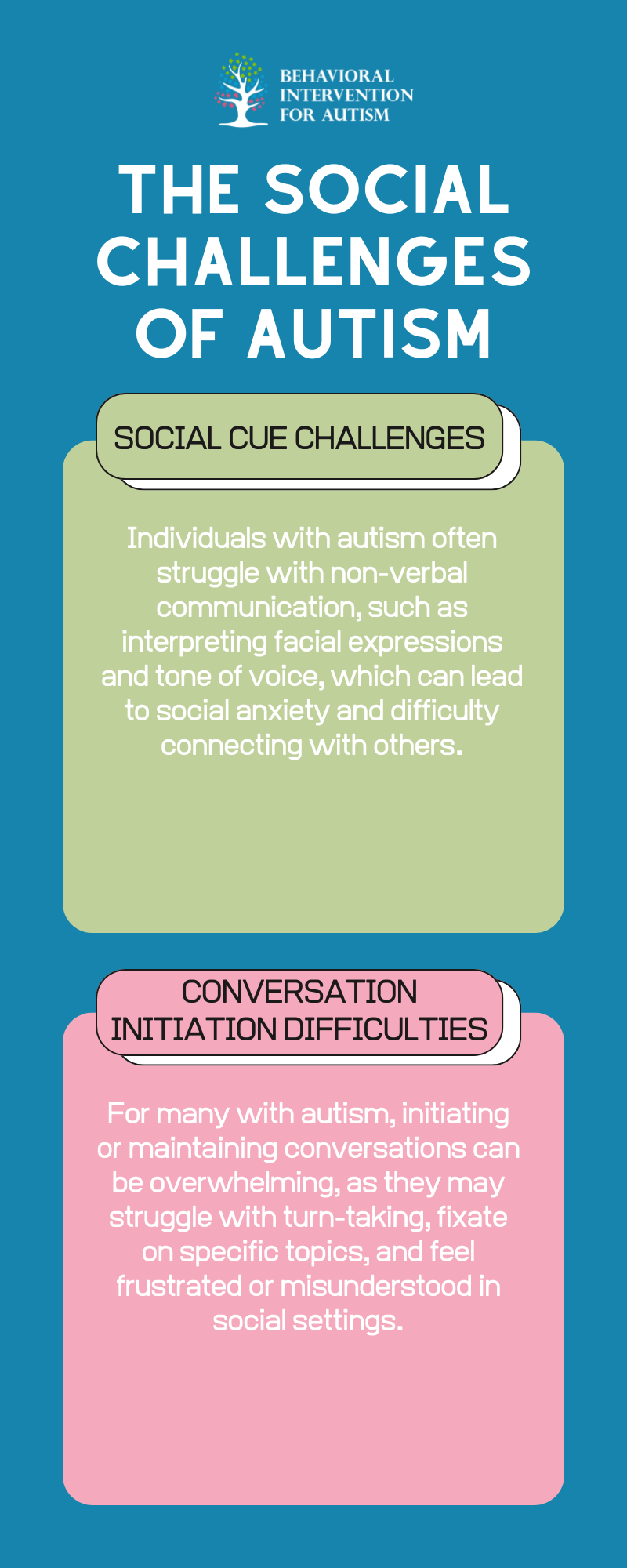
Table of Contents
Autism Spectrum Disorder (ASD) presents a wide array of challenges for individuals and their families. These challenges are not limited to a single area of life but often impact multiple aspects, including social interaction, communication, sensory experiences, and behavioral regulation. Understanding these challenges is essential in providing the support needed to help individuals with autism thrive in everyday life.
The Social Challenges of Autism
One of the most significant and often misunderstood challenges faced by individuals with autism is social interaction. People with ASD may find it difficult to interpret social cues, such as facial expressions or body language, making it harder for them to engage in typical social interactions. This difficulty in understanding social norms can lead to isolation or misunderstandings in both personal and professional settings.

Sensory Overload and Sensitivity
Sensory challenges are also a significant hurdle for many individuals with autism. The world can often feel overwhelming to someone with heightened sensory sensitivity. Common stimuli like loud noises, bright lights, or certain textures can be distressing and may lead to sensory overload. These experiences are not just uncomfortable but can trigger emotional or physical reactions.
- Sensitivity to Light, Sound, and Touch:
Many people with autism are hypersensitive to sensory stimuli. Bright lights, loud sounds, or certain textures can overwhelm their senses and lead to meltdowns or shutdowns. For instance, the buzzing of fluorescent lights might feel unbearable to an individual with autism, while others may become distressed by clothing tags or rough fabrics. - Coping with Sensory Overload:
Managing sensory overload often requires a calm environment with reduced stimuli. Some individuals use noise-canceling headphones, weighted blankets, or soothing sensory tools to help them cope with overwhelming situations. In environments like schools or workplaces, creating sensory-friendly spaces can make a significant difference in helping individuals with autism stay regulated.
Communication Difficulties
Communication challenges are a hallmark of autism, affecting the way individuals express themselves and understand others. These difficulties can range from nonverbal communication to struggles with verbal expression, comprehension, and understanding abstract concepts.
- Non-Verbal Communication:
For some individuals with autism, communication is non-verbal. They may use gestures, pictures, or devices to express their thoughts and needs. For those who are non-verbal, the lack of an immediate means to communicate can be a source of frustration and can create barriers to understanding from others.
- Struggles with Language and Speech:
While some individuals with autism are highly verbal, they may still face challenges with language development. Delays in speech, difficulty with complex sentence structures, or issues with tone and volume may be present. They may also have difficulty understanding idiomatic language or sarcasm, leading to confusion in everyday conversations. - Using Alternative Communication Methods:
For those who have difficulty with verbal communication, alternative methods such as augmentative and alternative communication (AAC) devices, sign language, or communication boards can provide a means of expression. These tools can help individuals with autism communicate more effectively and reduce frustration.

Behavioral and Emotional Regulation Challenges
Many individuals with autism face challenges with emotional regulation, which can result in behavioral difficulties. These challenges can manifest as meltdowns, self-injurious behavior, or extreme emotional reactions to seemingly small events.
- Meltdowns and Emotional Responses:
A meltdown occurs when an individual with autism becomes overwhelmed by sensory inputs or social situations, leading to intense emotional or behavioral responses. These meltdowns are often mistaken for tantrums, but they are typically a response to extreme stress or overstimulation, not an attempt to manipulate or control others.
- Understanding and Managing Emotions:
Because individuals with autism may have difficulty recognizing and understanding their emotions, they can struggle to express them in appropriate ways. Teaching emotional regulation strategies, such as deep breathing or using visual aids, can help individuals learn to manage their emotions more effectively. - Developing Coping Strategies:
Behavioral interventions, including applied behavior analysis (ABA), can be effective in teaching individuals with autism coping mechanisms for managing anxiety, frustration, or overstimulation. These techniques can help individuals develop more adaptive responses to stress, reducing the frequency and intensity of meltdowns.
The Role of Support Systems
While individuals with autism face various challenges, having the right support systems in place can make all the difference. Families, educators, therapists, and communities can all play a critical role in helping individuals with autism navigate these obstacles and thrive in their environments.
- Family Support:
Family members are often the first line of support for individuals with autism. A strong support network of family members who understand the unique needs of their loved ones can provide a safe and nurturing environment for growth. This support can include advocating for appropriate services, offering emotional support, and providing stability during times of challenge.
- Educational Support:
Education plays a significant role in helping individuals with autism succeed. Special education programs, individualized education programs (IEPs), and accommodations tailored to the individual’s needs can provide a more inclusive learning environment. Teachers trained in autism awareness can help students navigate social and academic challenges, fostering a more supportive school experience.
- Community and Professional Support:
Therapists and specialists, such as speech-language pathologists, occupational therapists, and ABA therapists, can provide targeted interventions to address specific challenges faced by individuals with autism. Additionally, community organizations and support groups can provide valuable resources and opportunities for social engagement, helping individuals with autism feel more connected and supported.
The challenges faced by individuals with autism are diverse and can be significant, but they do not define the potential of these individuals. With understanding, patience, and the right support, people with autism can lead fulfilling and meaningful lives. By embracing the differences in those with autism and fostering inclusive environments, we can create a world that values and supports neurodiversity.
Discover Support Tailored to Your Needs
Navigating the challenges of autism can feel overwhelming, but you don’t have to face them alone. Behavioral Intervention For Autism provides comprehensive ABA programs in Florida, designed to address the unique needs of individuals with autism. Our compassionate team works closely with families to create personalized, effective strategies that foster growth and independence. We’re dedicated to delivering exceptional care that makes a real difference. Take the first step towards a brighter future—contact us today to learn how we can help support your journey.
- 9 Common Obsessions of Children With Autism You Should Know - February 25, 2025
- What is Neurodiversity? A Guide to Embracing Differences - February 25, 2025
- Understanding Hyperfocus in Autism: What It Means and Why It Happens - February 25, 2025
